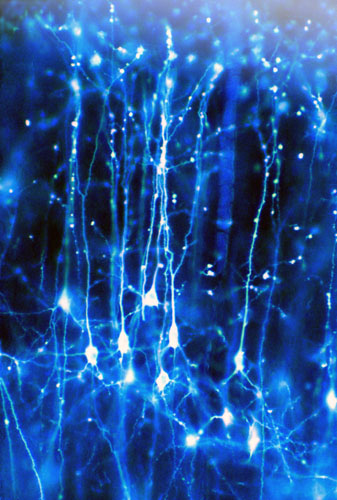 Neuronal Regerneration: Different Approaches
Neuronal Regerneration: Different Approaches
 Neuronal Regerneration: Mechanism
Neuronal Regerneration: Mechanism
 Axonal damage is critical to the etiology of CNS injuries and neurodegenerative
diseases (spinal cord injury, Alzheimer disease). Efforts focus on the
molecular and cellular mechanisms that influence axonal plasticity and response
to injury.
Axonal damage is critical to the etiology of CNS injuries and neurodegenerative
diseases (spinal cord injury, Alzheimer disease). Efforts focus on the
molecular and cellular mechanisms that influence axonal plasticity and response
to injury.
> Investigation of axonal biology in the central nervous system (CNS) is
hindered by lack of an appropriate in vitro method to separate axons
independently from cell bodies.
Investigation of axonal biology in the central nervous system (CNS) is
hindered by lack of an appropriate in vitro method to separate axons
independently from cell bodies.
 Control over neuronal growth is a fundamental objective in biophysics,
neuroscience, cell biology and biomedicine and is most important for the
formation of neural circuits in vitro, as well as nerve regeneration in
vivo.
Control over neuronal growth is a fundamental objective in biophysics,
neuroscience, cell biology and biomedicine and is most important for the
formation of neural circuits in vitro, as well as nerve regeneration in
vivo.
 Only small random neuronal
networks have been built in contact with semiconductor structures because
damaging tensions rip apart neuronal structures formed on the substrate.
Only small random neuronal
networks have been built in contact with semiconductor structures because
damaging tensions rip apart neuronal structures formed on the substrate.
 Understanding how
nerves regenerate is an important step towards developing treatments for human
neurological disease.
Understanding how
nerves regenerate is an important step towards developing treatments for human
neurological disease.
 Knowledge of axonal injury and regeneration thereafter
is critical to the etiology of CNS injuries and neurodegenerative disease (for
example, spinal cord injury and Alzheimer disease); therefore, considerable
effort focuses on the molecular and cellular mechanisms that influence axonal
plasticity and response to injury.
Knowledge of axonal injury and regeneration thereafter
is critical to the etiology of CNS injuries and neurodegenerative disease (for
example, spinal cord injury and Alzheimer disease); therefore, considerable
effort focuses on the molecular and cellular mechanisms that influence axonal
plasticity and response to injury.
 In the case of endogenous or exogenous nerve injury,
medication for the blood disease or injury is the only useful treatment.
However, the patient occasionally has a functional disability as a sequela.
Regeneration of injured nerves and recovery of function is desired. Hence regeneration
of the central nervous system is very important.
In the case of endogenous or exogenous nerve injury,
medication for the blood disease or injury is the only useful treatment.
However, the patient occasionally has a functional disability as a sequela.
Regeneration of injured nerves and recovery of function is desired. Hence regeneration
of the central nervous system is very important.
 Future ability to regenerate the retinal neurons to treat various eye
disorders.
Future ability to regenerate the retinal neurons to treat various eye
disorders.

